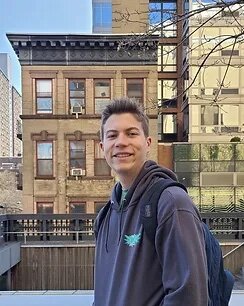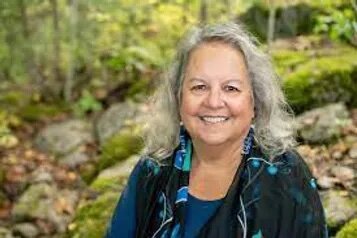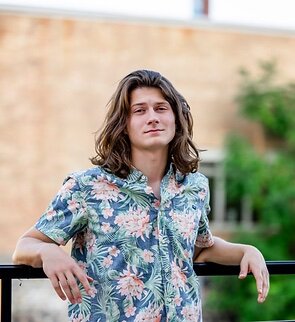Voices of Youth: State’s largest high school Climate Symposium hosted by Calhoun County students
Calhoun County students are hosting Michigan's largest high school climate symposium. Representing seven school districts, these climate activists spent after-school hours organizing the event that features "Braiding Sweetgrass" author Robin Wall Kimmerer, among other climate standouts.
Editor’s Note: This story is part of Southwest Michigan Second Wave’s Voices of Youth Battle Creek program which is supported by the BINDA Foundation, City of Battle Creek, Battle Creek Community Foundation, and the Michigan Afterschool Partnership. This series features stories created by Calhoun County youth in partnership with professional mentors, as well as feature stories by adult writers that examine issues of importance to local youth.
BATTLE CREEK, MI — Michigan is a state with clear climate intentions. In the 2022 MI Healthy Climate Plan, state lawmakers laid out a path for change and growth in every sector to protect the environment. This includes increasing local support of climate projects. Students in Battle Creek and surrounding areas took up that call.
With over four years of organizing experience, the students who make up the Battle Creek Area Math and Science Center (BCAMSC) Climate Club put in the hard work to bring together the fifth annual High School Climate Change Symposium, joining forces with 10 speakers from around the world to educate on their areas of expertise.
The 10-student committee represents seven local schools including Harper Creek, Battle Creek Central, Lakeview, Pennfield, Marshall, Olivet, and Homer. Under the guidance of University of Michigan graduate student Tim Muhich, the group worked for months to bring together a prestigious lineup of top scholars, researchers, and activists. Students meet after school on Sundays, also devoting time during the week to plan the April 6th climate symposium, among other projects.

“This event really tells you about the less talked-about aspects of climate change,” says Elijah Fox, a senior at Pennfield High School and speaker coordinator for the conference. “We have one speaker on forest ecology, one on fashion, another on public health, and autoimmunity related to climate change.”
Speakers for the 2024 symposium include Dr. Frederick Miller, an Immunologist at the National Institute of Health who specializes in how the environment affects health, as well as top academics, such as Dr. Peter Reich of the University of Michigan, Eric Fine and Dr. Robert Dubrow from Yale University, Dr. Tessa Hill from the University of California Davis, and Charlotte McCurdy of Stanford. The event also features international speakers, including Neshaad Shafi, a co-founder of youth climate initiatives from the Middle East, and Dr. Lily Odarno director of clean energy programs in Africa. Finally, Dr. Renee Lertzman, a top psychologist in the area of environment and climate change, will also offer a talk.
The full-day event takes place this year online, which helps ensure that more students and renowned speakers can participate.
Student organizers have made it a priority to provide event presentations on a broad range of topics that climate change interacts with such as fashion design and psychology. The hope is to reach out to the communities’ youth who may not be very interested in climate change itself but may have an interest in other areas that are affected by climate change.
The Keynote address will be given at 9:00 a.m. to 9:55 a.m. (EST) by the reputed author and MacArthur Fellow Robin Wall Kimmerer. Her work on the New York Times Bestseller “Braiding Sweetgrass” launched a new way of thinking about climate and personal activism into the mainstream. With her emphasis on the melding of ideas from Western science and indigenous practices, she brings a unique angle to the heavily science-based topic.

“Braiding Sweetgrass” has done much to encourage activism in the climate change world, a spirit that Ashley Rawlings, president of the committee, wishes to capture. Ashley shares her experience with the symposium and its effects on inspiring the youth. “So, for me, I mean I really wasn’t interested in climate change — I went to a symposium a couple of years ago and it sparked a passion in me.”
Many of the students who attended the symposia in years past shared a similar story. The annual event has ignited climate interest in those who have participated, a passion the organizers hope leads to even small changes in daily life that benefit both nature and the climate, such as composting, planting a garden, or reducing carbon usage through modes of transportation. Some past participants have an even bigger fire lit in them as most of this year’s organizers were not originally interested in climate change but became activists in their own right through their interactions with the symposia.

The symposium has also had a track record of producing students who go on to do environmental research. Many of its past organizers have had or are in the middle of having successful college research careers. Tim Muhich, advisor of the symposium and research graduate student, says “One of the former organizers of the event now works in the same building that that I do here at at the University of Michigan. And is doing tons of great climate change research.”
Muhich says that while climate research is important, climate issues are caused by the community and will need to be fixed by the community coming together. Working with students to organize the symposium was a way, he says, that he saw to build the bridges that would be used to fix the major challenge
facing our world.

“Climate change isn’t a problem to be solved with science. It’s a problem that gets solved socially,” says Muhich. “It’s a problem that gets solved by making connections and building communities and tackling problems together.”
The symposium has certainly left its mark on the community of BCAMSC. Last year it was hosted in person for the students to enjoy the lectures of the academics. This year it will be hosted online by Zoom, Saturday, April 6th from 9:00 a.m. to 4 p.m. Check out the schedule and presenter details, as well as registration for the symposium HERE.

Trey Sebring is a senior at Battle Creek Central High School and the Battle Creek Area Mathematics and Science Center. He is a member of Central’s tennis team, The Youth Alliance Committee, as well as an organizer of the High School Climate Change Symposium. In his spare time, he enjoys mountain biking, camping, rock climbing, and all things coming from Nature. He has spent significant time out in the wilderness and has a passion for preserving it. He wants to increase the prevalence of youth environmental activism and bring it to the forefront of modern environmental discourse.















